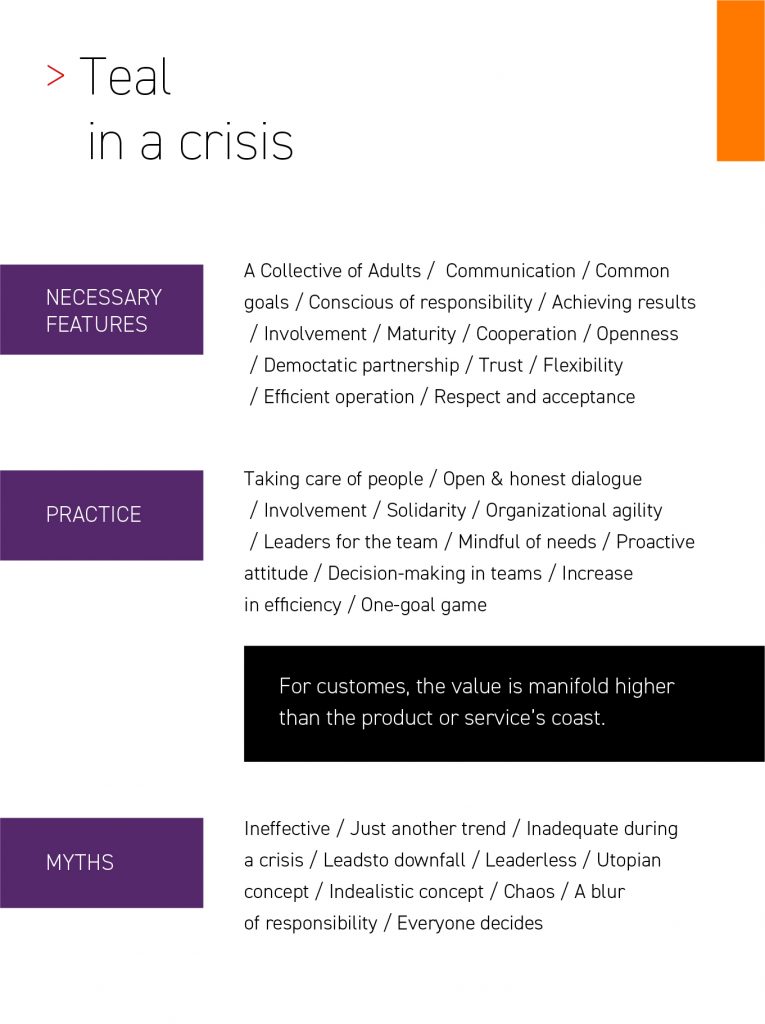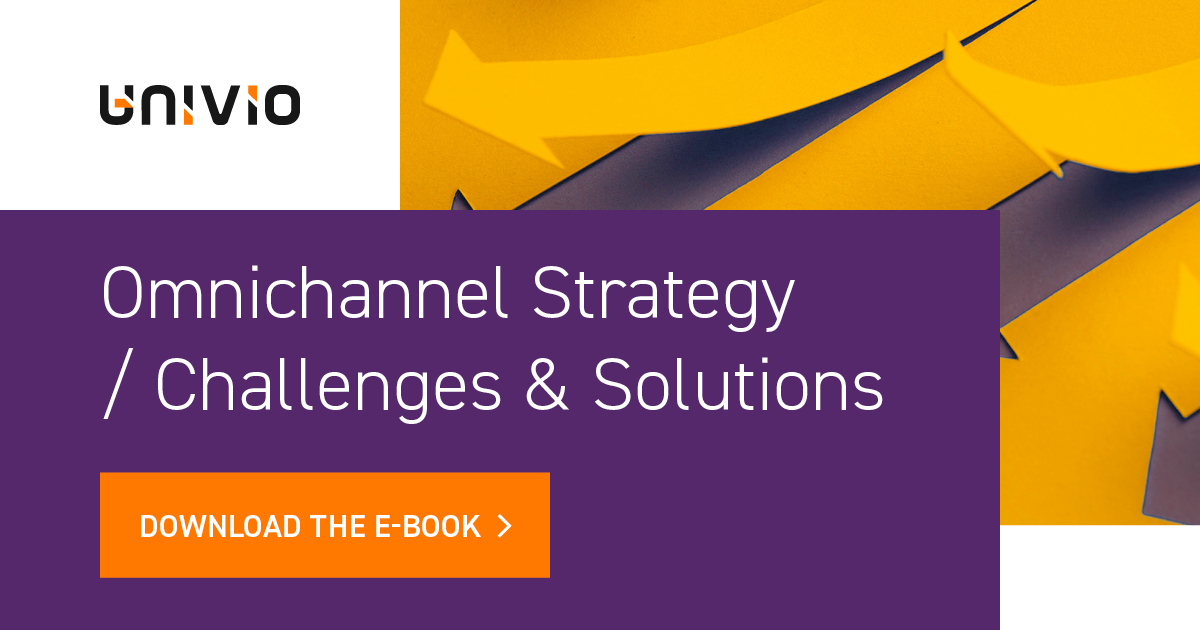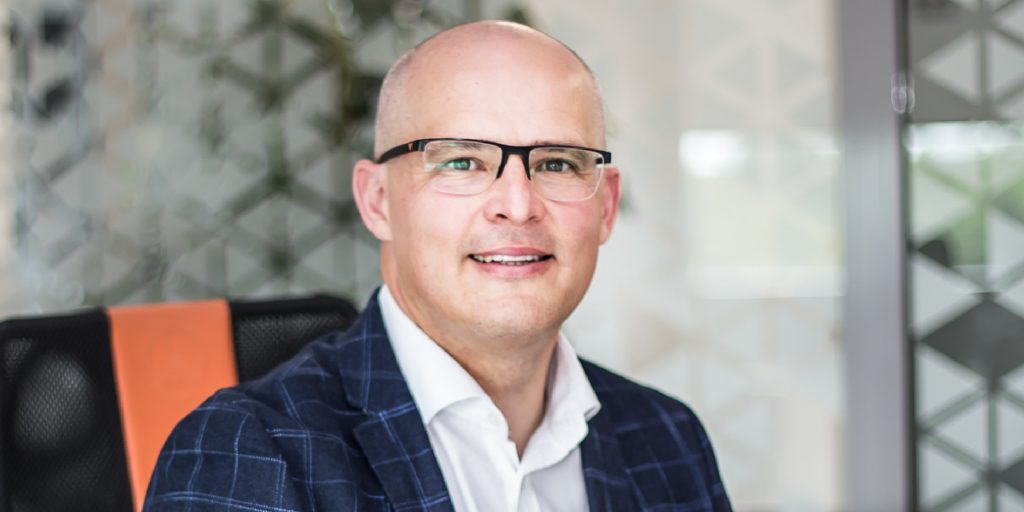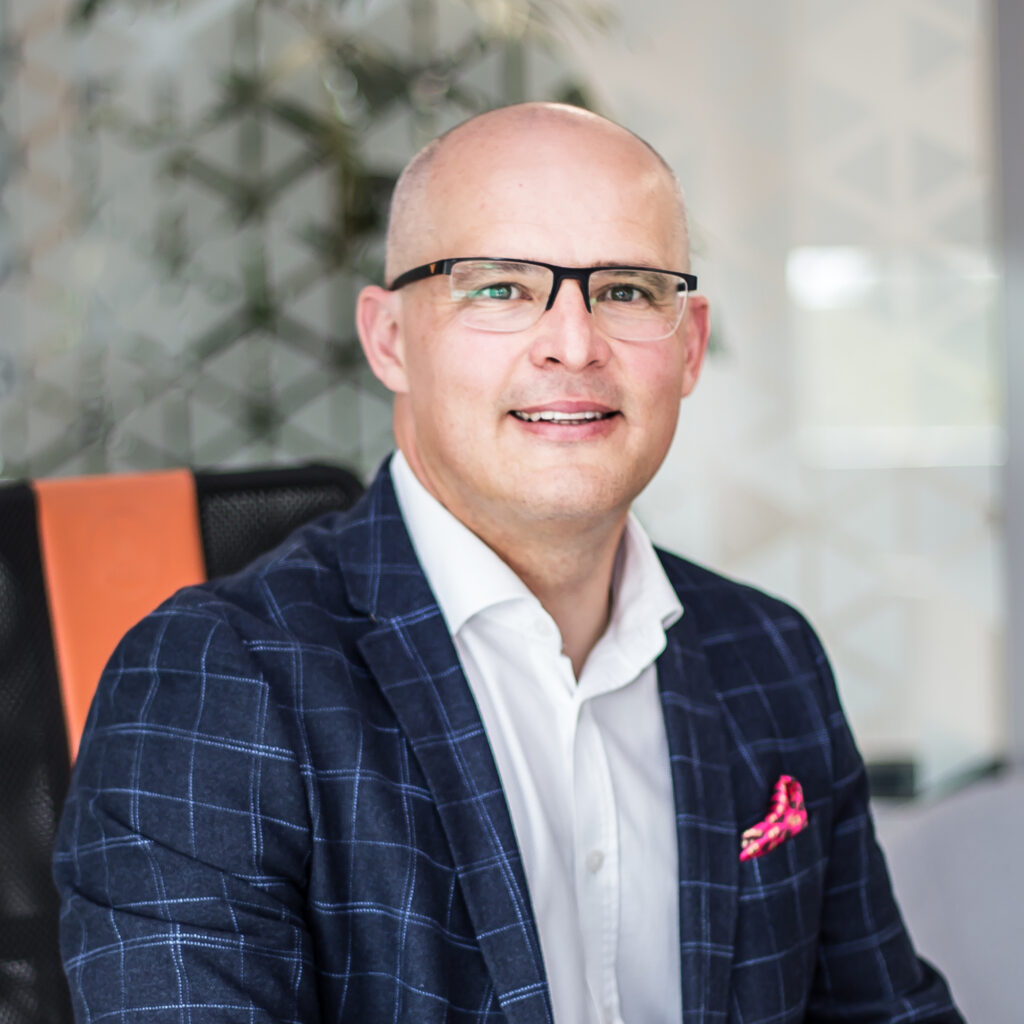Teal in a Crisis – Myths vs. Practice
In the face of ongoing pandemic, the resulting economic crisis and the difficulties of many companies, I am increasingly confronted with the question of the most appropriate organisational model – one that’s resistant to difficult times. Many publicists, and sometimes business practitioners, are putting forward the hypothesis that this is the moment to give up democracy, which may have worked during the good, stable times, but not now. Teal (also known as Turquoise) in business is seen as an idealistic concept, too frivolous to be effective. Many believe that a strong leader is needed for a time of crisis, a quick and bold decision maker – a general. However, putting this approach into practice, something I deal with on a daily basis, contradicts these assumptions.
Mythical Concepts
The topics of both agility and Turquoise operations in organizations have been very popular for several years. Both themes are exploited to such an extent that they are slowly being perceived as successive “buzzwords” – empty phrases. I recently read that an organization is “really agile” if it is able to adapt to the situation (with full agreement) and to stick to one style of leadership, while a strictly “soft” approach to management, especially in times of crisis, is not agile (here my doubts arose). I learned that, if we take into account the factors that determine the actions of a leader during a crisis, namely the need to both make and implement decisions in an extremely short time and with very high stakes, such as the survival of the company or the health of employees – the right choice is to use “harder” tactics.
In my opinion, such an attempt to differentiate the world (and thus also the actions of leaders and their preferred leadership styles) by splitting every organization in two – comparing sparse and unfocused democratic processes with supposedly very efficient authoritarian models that produce professional outcomes – results from a still incomplete understanding of what Turquoise actually is.
I see Turquoise organizations as an extreme concept that does not bring positive effects for the company in the long run, on the contrary. Blurring of responsibilities, lack of clear division of responsibilities and as a result lack of goals are some of the negative effects of turquoise management.
– argues prof. Paweł Korzyński, Head of the Department of Human Resource Management at Kozminski University.
However, in my opinion, Teal is not an idealistic concept, it does not assume chaos, it does not promote the abandonment of goals, it does not assume a lack of effectiveness and speed… it is a responsible social contract, beneficial for all parties, and implemented with both commitment and passion.
Teal in Practice
At Univio, which has been on a stable growth path for 23 years, we’ve survived both the Internet bubble in 2000 and the financial crisis in 2008 – and we’re still growing rapidly today, I see a practical side to how we operate. It cannot be denied that Teal (as well as agility) is in our DNA. When we came across Frederic Laloux’s book “Working differently” years ago, we knew we were going in the right direction. The author himself is pointing the way:
If we are to overcome the terrible problems of our time, we will need a new type of organization, i.e. companies more focused on providing a sense of meaning […] Anyone who breaks out of line and takes the risk of new solutions is likely to encounter resistance or be called naive, an idealist or a fool. Anthropologist Margaret Mead once said: ‘Never doubt that a small group of thoughtful, committed citizens can change the world; indeed, it’s the only thing that ever has.’
– says Frederic Laloux.
In practice, it is Teal that makes it possible to navigate in a crisis situation.
- Self-organization, one of the pillars of the Turquoise philosophy, allows for the flexible adaptation of work to current needs and requirements, which can evolve quickly in a crisis.
- The lack of rigid divisions of responsibilities means that everyone can use their talents in different areas, without worrying about the characteristic silos in the hierarchy. What’s more, each individual does it with commitment and responsibility, often putting the organization’s interests before his or her own.
- Transparency plays an enormous role here. People with full access to information are able to make more relevant and quicker decisions, something that’s highly important in uncertain times. Priorities are determined by circumstances rather than a rigid framework of objectives and plans.
In Teal organizations, it is much easier to change direction safely and effectively. In times of crisis, this is an extremely valuable competence. Turquoise is primarily a work based on common, real values. It gives a sense of security, builds trust and, as a result, commitment. Independent, conscious and influential employees support the organization in difficult times much more. They co-create solutions, are ready to make sacrifices and live through the situation with the organization. They are responsible for it and for each other.
Andrzej Blikle, professor of the Polish Academy of Sciences, member of the European Academy of Sciences, former president of the Polish Information Society and honorary president of the Adam Smith Centre explains:
The view that healthy and happy people work better is probably known in philosophy for 2.5 thousand years. And we usually believe in this view, but the business world often thinks it is impractical. That people are inherently lazy and dishonest, so you have to chase them to work with a stick and a carrot.
It turns out, however, that these “motivational techniques” are completely ineffective and even counter-productive, because they only motivate people to earn bonuses. In turn, they demotivate very strongly for good work. I think that Turquoise is a certain answer to the arrogance and aggression spreading around the world.
The group of entrepreneurs and managers who believe that Turquoise can be successfully implemented in the organization was very small for many years.
One of the practitioners who shared his experiences and reflections on this process is Andrzej Jeznach, author of the book “Boss who has time. Evolution of management – a journal of building a Turquoise company”. As a CEO of a mature company, I appreciate the fact that the author writes not only about successes, but also about dilemmas or challenges, which can never be avoided, and are intensified in a crisis. However, he invariably comes to the same conclusion, which I also reached when observing Univio both in everyday life and in difficult times:
The company not only thrives and thrives, but I can see that my employees feel fulfilled and satisfied. The employees […] decide for themselves. I, on the other hand, have gained more respect for them, because I often learn from them.
– notes Andrzej Jeznach.
The author also goes on to add:
Today I say with full conviction that if the boss is in fact the smartest, most efficient and best informed person in the company, I do not know anything good for the near future.
Teal is for Mature People
Despite the fact that the topic of Turquoise is extremely fashionable, and companies outdo each other in showing who has what kind of practices (these often turn out to be only a theory after deeper verification), I have the impression that we are losing the essence of what it is in practice somewhere. The Teal organization is certainly not what we call in our company semi-colonies for adults. It does not focus on the lack of responsibility, any kind of treatment of duties, giant offices or exploding benefits. Turquoise is not only where there is no hierarchy and division of tasks, where transparency is understood as participation in many discussion clubs, where everyone has space to express their opinion on every issue that interests them.
But Teal is definitely about:
- Common goals that are fun to pursue.
- Being committed to achieving results.
- Conscious responsibility.
- Maturity and a collection of adults.
- Operational efficiency – the self-organization of teams, flexibility and a role more important than a position in the hierarchy, which turquoise, in my view, doesn’t remove where it is needed and actively helps.
- The proactive approach of each person forming the organization.
- Respect and acceptance.
- Democratic partnership – a democracy in which several people who know about a given topic make decisions and the rest trust them.

Turquoise is of course also about working with customers. When the company is actually practicing teal – rather than following it conceptually – the customers can also receive valuable results from suppliers that are many times higher than the amounts paid for products or services.
The Actual Test
At Univio, for many years we have been consistently building an organizational culture that draws handfuls from Turquoise. It is now, during the crisis caused by the COVID-19 pandemic, that the organizational culture is being tested and developed. In these difficult moments at the beginning of the pandemic, it was our teams that decided on the mode of switching to remote work independently and responsibly; within a few days, they reorganized the work to meet their own and their customers’ needs, adapting their activities to an urgent and demanding situation. The company’s leaders immediately organized themselves into a crisis team, which provided all other teams with the necessary support, set the directions for action, took care of intensive, transparent communication and ensured security for our employees.
We listened to what the teams needed to efficiently transform their activities and adjust their goals. Yes, there was stress, difficult conversations and some uncertainty, but most of all there was trust, cooperation, sincere conversations, commitment and understanding. Thanks to Turquoise practices, we avoided the need for specific directives, controls, irresponsibility or inefficiency.
We do not plan to turn to an authoritarian organization because we operate on the basis of a mutual declaration concerning all the people who make up our company. This agreement adopts a culture of independence and agility, is both personal and team-oriented, promotes responsibility (given and accepted) and cooperation as its overriding values, delegates powers down to teams, is based on a flat organizational structure where role is more important than position, and where decisions are made based on the company’s strategic objectives, its mission and vision, with which we truly identify.
In each of these aspects, we take a number of actions to put these mutual declarations into practice. This is not an easy and short process – it cannot be handled as part of a “culture implementation project”. Today’s decisions and behaviors have a direct impact on what kind of organization we will be in the future … and what kind of organization we will not. Organizational culture is something invisible and undefined, but very real and has a fundamental impact on the effectiveness of activities. In our case, we pass the test well, and turquoise helps us a lot.
I am proud of the whole Univio team.









